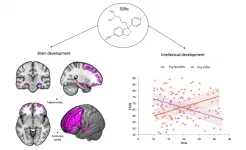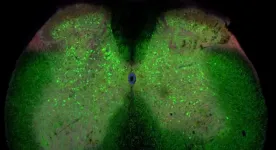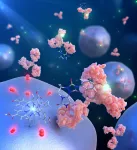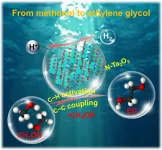Protecting the intellectual abilities of people at risk for psychosis
A UNIGE team has found that a class of drugs can protect the development of intellectual abilities in people at risk of psychosis, if prescribed before adolescence
2021-06-01
(Press-News.org) One person in 2000 suffers from a microdeletion of chromosome 22 that can lead to the development of psychotic disorders, such as schizophrenia, in adolescence. In addition to symptoms such as hallucinations or delusions, psychotic disorders also comes with a progressive decline in intelligence quotient (IQ). If current drug treatments are successful in containing psychotic symptoms, nothing can be done to prevent the deterioration of intellectual skills that leads to loss of autonomy. Researchers at the University of Geneva (UNIGE), Switzerland, have discovered that prescription of selective serotonin reuptake inhibitors (SSRIs) - a class of drugs used to treat anxiety and depression -in late childhood can reduce the deterioration of intellectual abilities, and have a neuroprotective effect on some of the brain regions affected by the psychotic illness. This study, to be read in the journal Translational Psychiatry, opens up a new field of research and new hope for people affected by the microdeletion of chromosome 22.
The average IQ is around 100 points. However, for people who may develop a psychotic illness, such as those with a microdeletion of chromosome 22, the average drops to 70-80 points. "The problem is that when a psychotic disorder occurs, such as schizophrenia, the brain frontal lobe and the hippocampus are particularly affected, which leads to the gradual deterioration of already below-average intellectual capacities", explains Valentina Mancini, a researcher in the Department of Psychiatry at UNIGE Faculty of Medicine and first author of the study. From then on, the average IQ drops to around 65-70 points, leading to a loss of autonomy that requires a protected environment. "At present, drug treatments manage to contain psychotic symptoms, such as hallucinations, anxiety or distortion of reality, but there is no treatment that can reduce the deterioration of affected people's intellectual capacities", notes the Geneva researcher.
200 patients followed over a 20 years period reveal a possible solution
The team of Stéphan Eliez, professor in the Department of Psychiatry at UNIGE Faculty of Medicine, has been following 200 patients affected by the microdeletion of chromosome 22 for the past 20 years. "30 to 40% of them developed schizophrenia psychotic disorder", he explains. "Thanks to this cohort, we found that people suffering from this syndrome lost 7 to 8 IQ points from childhood to adulthood. This figure rises to 15 IQ points for those who developed psychotic disorders."
Yet the physicians noted that two to three teenagers a year are exceptions, and even gained IQ points. Why? "We made a comprehensive analysis of these patients' medical data to find out any common feature in the treatments prescribed to them by their GP", explains Valentina Mancini. Two observations caught their attention.
The first is the prescription of small, regular doses of SSRIs - a drug that increases the levels of serotonin, a neurotransmitter involved in the regulation of behaviour - in late childhood and throughout adolescence. "These drugs increase neurogenesis and act on synaptic plasticity. They are prescribed today to reduce anxiety and depressive symptoms", explains the Geneva researcher. And the younger the patients received this treatment, at around 10-12 years of age, the more the frontal lobe and the hippocampus - and therefore the intellectual capacities - were preserved from deterioration caused by the psychotic illness. The second observation is that a neuroleptic drug - prescribed in small doses to control psychotic symptoms such as hallucinations or delusions - also seems to have a positive effect if added to SSRIs during adolescence. "These two medications, especially when combined, have thus preserved the anatomical structure of the brain affected by the degradation responsible for the decline in intellectual capacity", remarks Stéphan Eliez.
A promising discovery for the future of people at risk of psychosis
This study provides for the first time an indication of a neuroprotective preventive treatment for the development and preservation of IQ. "It should be stressed that too great a deterioration of intellectual skills progressively leads to a very problematic psychosocial dependence. Here, we could succeed in protecting this population", notes Stéphan Eliez.
Once the results of this study are confirmed, the effect of SSRIs could be tested on other types of patients and possibly prescribed preventively to people at risk of intellectual deterioration, such as individuals with other genetic syndromes like Fragile X or Down's syndrome, or children of schizophrenic parents. "We also want to investigate whether the 3% to 4% of adolescents in the general population who develop psychotic symptoms would see this risk reduced by taking this drug", continues Valentina Mancini.
The Geneva team will now compare the results obtained from their research cohort with international databases in order to confirm the neuroprotective role induced by these treatments prescribed at the end of childhood, adolescence being the critical phase for the onset of psychotic diseases.
INFORMATION:
[Attachments] See images for this press release:

ELSE PRESS RELEASES FROM THIS DATE:
2021-06-01
ALS is a very severe neurodegenerative disease in which nerve cells in the spinal cord controlling muscles and movement slowly die. There is no effective treatment and the average life expectancy after being diagnosed with ALS is usually short. Because of this, new knowledge about the disease is urgently needed.
Now, researchers from the University of Copenhagen have gained new insights about ALS, by investigating the early development of the disease in a mouse model.
"We have found that networks of nerve cells in the spinal cord called inhibitory interneurons lose connection to motor neurons, the nerve ...
2021-06-01
Researchers have created a new nanometer-scale proximity labeling system that targets histidine residues quickly, providing a new chemical tool in protein chemical modification.
The results of their research were published in the Journal of the American Chemical Society on April 27, 2021.
Protein chemical modification, a technology that introduces functions into the chemical structure of proteins through irreversible strong bonds, is used for the creation of protein-based biomaterials and for drug delivery systems.
In order to carry out modification, protein labeling is necessary. Proximity labeling is one of those techniques. It labels biomolecules located close to a protein of interest which can then also be marked ...
2021-06-01
The photochemistry of the future will spring up human industry without smoke, and bring a brighter civilization based on the utilization of solar energy instead of fossil energy. Photochemistry has been used in controlling many reaction processes, especially for the challenging reactions containing selective C-H activation and C-C coupling in chemical synthesis. It is of great interests that a "dream catalytic reaction" of direct coupling of methanol to ethylene glycol (2CH3OH ? HOCH2CH2OH + H2, denoted as MTEG) could be achieved through the solar energy-driven C-H activation and C-C coupling processes, and this MTEG reaction has not been achieved through thermocatalysis yet.
Ethylene glycol (EG) is an important monomer for the manufacture of polymers (e.g., poly(ethylene ...
2021-06-01
Spending time outdoors is good for a person's body and soul, but how good is it for the wildlife around us?
Outdoor recreation has become a popular activity, especially in the midst of a pandemic, where access to indoor activities might be limited. Long known to have negative behavioural and physiological effects on wildlife, outdoor recreation is one of the biggest threats to protected areas. Human disturbance to animal habitats can lower their survival and reproduction rates, and ultimately shrink populations or eradicate them from areas where they would ...
2021-06-01
Researchers have identified the key factors that influence a vital pattern of ocean currents.
The Atlantic meridional overturning circulation (AMOC) carries warm water from the tropics northward.
Many scientists think that this heat transport makes areas including north-west Europe and the UK warmer than they would otherwise be.
Climate models suggest the AMOC is likely to weaken over the coming decades, with widespread implications for regional and global climate.
The new study - led by the universities of Exeter and Oxford, and published in Nature Geoscience - pinpoints the causes of monthly and annual AMOC variation and finds a differing picture at two key locations.
Observational data came from large ...
2021-06-01
The Covid-19 pandemic has introduced us to expressions like 'lockdown', 'isolation' and 'social distancing', which became part of social conduct all over the world. Now it appears that bats also maintain social distancing which might help prevent the spread of contagious diseases in their colonies. In a new study published in Annals of the New York Academy of Science, researchers from Tel Aviv University demonstrate that sick bats, just like ill humans, prefer to stay away from their communities, probably as a means for recovery, and possibly also as a measure for protecting others. The study was conducted by postdoctoral researcher Dr. Kelsey Moreno and PhD candidate Maya Weinberg ...
2021-06-01
Methane emissions from North American livestock may be routinely undercounted, a new analysis by researchers at New York University and Johns Hopkins University finds. The work also notes that in developing countries, where animal agriculture is becoming increasingly industrialized, methane emissions could rise more than expected.
These assessments are based on a review, appearing in the journal Environmental Research Letters, of eight existing studies.
Methane is a global warming gas even more powerful than CO2. Its amount and lifetime in the atmosphere are smaller than CO2, but quantities are still increasing. The United Nations has recently ...
2021-06-01
RNA sequencing is a powerful technology for studying cells and diseases. In particular, single-cell RNA sequencing helps uncover the heterogeneity and diversity of our body. This is the central technology of the "Human Cell Atlas" in its quest to map all human cells. However, single-cell RNA sequencing reaches its limits in very large projects, as it is time-consuming and very expensive. To address these challenges, scientists from the research group of Christoph Bock, principal investigator at the CeMM Research Center for Molecular Medicine of the Austrian Academy of Sciences and professor at the Medical University of Vienna, developed ...
2021-06-01
Researchers at the Biomedicine Institute of Seville (IBiS) have discovered a new mechanism of Alzheimer's disease that disorganises the blood vessels around amyloid plaques, one of the characteristic features of the disease. The study, published in the international journal Nature Communications, was led by the laboratory of Dr. Alberto Pascual, from the Neuronal Maintenance Mechanisms Group at IBiS and was chiefly carried out by María Isabel Álvarez Vergara and Alicia E. Rosales-Nieves.
Relevance of the finding
Alzheimer's disease is the leading cause of dementia worldwide. In Spain, its incidence is increasing dramatically as the population ages and yet, unfortunately, the origin of the disease is still unknown.
The mechanism put forward ...
2021-06-01
New research has found that adolescents with higher levels of an omega-3 fatty acid in their blood were less likely to develop psychotic disorder in early adulthood, suggesting that it may have a potential preventative effect of reducing the risk of psychosis.
The study, led by researchers from RCSI University of Medicine and Health Sciences, is published in END ...
LAST 30 PRESS RELEASES:
[Press-News.org] Protecting the intellectual abilities of people at risk for psychosis
A UNIGE team has found that a class of drugs can protect the development of intellectual abilities in people at risk of psychosis, if prescribed before adolescence







